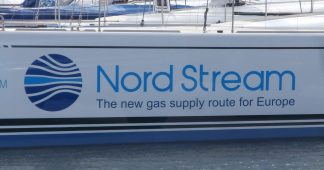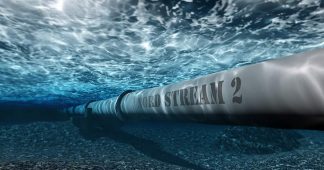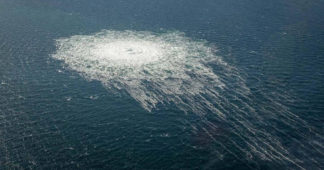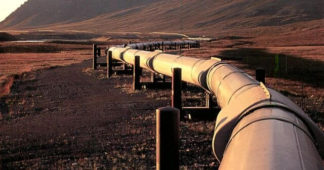For decades the U.S. opposed European projects to receive energy from Russia. It wants Europe to buy more expensive U.S. oil and gas.
US plan was always to stop EU buying Russia's gas
2014
Rice:"You want to change the structure of energy dependence. You want to depend more on the North America energy platform … to have pipelines that don't go through Ukraine & Russia"https://t.co/lRCQyEkShz#NordStream2 pic.twitter.com/iDJb17eBSn— the Lemniscat (@theLemniscat) September 27, 2022
Europe’s, and especially Germany’s industry, depends on cheap energy from Russia. Without it Europe will be de-industrialized and go broke.
The U.S. had threatened to disable the pipelines connecting Europe to Russia.
Pres. Biden: "If Russia invades…then there will be no longer a Nord Stream 2. We will bring an end to it."
Reporter: "But how will you do that, exactly, since…the project is in Germany's control?"
Biden: "I promise you, we will be able to do that." https://t.co/uruQ4F4zM9 pic.twitter.com/4ksDaaU0YC
— ABC News (@ABC) February 7, 2022
Currently the U.S. is winning its war on Europe’s, mainly Germany’s, industries and people. Yesterday’s sabotage attack on the Nord Stream I and II pipelines, which are supposed to bring Russian natural gas to Germany, mean that the the war on Germany has entered its hot phase.
A question remains: Whodunnit?
Russia has no motive to destroy the pipelines it owns. These are valuable, long term assets and the gas that escaped from them yesterday was on its own worth some $600 to $800 million.
A pipeline that could be turned off and on again was a leverage point for Russia that gave it some negotiation power. A destroyed pipeline gives Russia no leverage. This is truly elementary. One can not spin that away.
During the war in Ukraine Russia has not stopped to deliver gas to Europe as contractually agreed. Instead European countries, Poland, Ukraine and Germany have blocked overland and sub sea pipelines that brought gas to Germany.
German people have protested against the U.S. ordered shut down of the Nord Stream II pipeline. (Nord Stream I was recently offline because Siemens was prevented by sanctions from maintaining its compressor turbines.)
Thousands of people in Gera in Germany against Olaf Scholz's policy and the explosion of energy and gas prices. They demand an end to sanctions on Russia and the reopening of the Nord Stream 2 gas pipeline. Demonstrations also in other German cities but EU media censors them. pic.twitter.com/dmTMLY11jn
— RadioGenova (@RadioGenova) September 26, 2022
A day after the protests the pipelines were sabotaged:
HERE IT IS
Footage from the site of a gas leak on the underwater section of the Nord Stream.
The video was published by the Danish military.
Earlier, the Kremlin said that it was most likely about sabotage.
The same opinion was expressed in the German government. pic.twitter.com/Jg72xQxNjE
— AZ ???? (@AZmilitary1) September 27, 2022
Yesterday’s attack on the Nord Stream system is not unprecedented:
In 2015, the annual routine underwater survey of the Nord Stream 1 pipelines came across a remote operated vehicle rigged with explosives right next to one of the lines in Swedish waters.
The umbilical cable had been cut. The drone’s national origin was never disclosed. ?
— professional hog groomer (@bidetmarxman) September 27, 2022
In 2015 Pipeline Journal reported:
[T]he Swedish military has successfully cleared a remote operated vehicle (drone) rigged with explosives found near Line 2 of the Nord Stream Natural Gas offshore pipeline system.
The vehicle was discovered during a routine survey operation as part of the annual integrity assessment of the Nord Stream pipeline. Since it was within the Swedish Exclusive Economic Zone (EEZ) approximately 120 km away from the island of Gotland, the Swedes called on their armed forces to remove and ultimately disarm the object….
The national identity of the drone has not been verified so far, as many countries use Unmanned Underwater Vehicles (UUVs) of a similar construction, [Jesper Stolpe, Swedish Armed Forces spokesman,] said.
To destroy a sub sea pipeline requires more than a ROV/drone delivered shaped charge.
How strong is a Nord Stream pipe? Quite!
The steel pipe itself has a wall of 4.1 centimeters (1.6 inches), and it's coated with another 6-11 cm of steel-reinforced concrete. Each section of the pipe weighs 11 tonnes, which goes to 24-25 tonnes after the concrete is applied. pic.twitter.com/BFYnv36CaF
— Javier Blas (@JavierBlas) September 27, 2022
It wasn’t earthquakes that destroyed the pipelines. These were several well targeted and massive explosions:
A Swedish seismologist said on Tuesday he was certain the seismic activity detected at the site of the Nord Stream pipeline gas leaks in the Baltic Sea was caused by explosions and not earthquakes nor landslides.
Bjorn Lund, seismologist at the Swedish National Seismic Network at Uppsala University, said seismic data gathered by him and Nordic colleagues showed that the explosions took place in the water and not in the rock under the seabed.
The targeted explosions were not small:
Swedish seismologists from Lund University noted that "at least 100 kg of TNT (perhaps more) were used to destroy the pipelines."
— Dagny Taggart (@DagnyTaggart963) September 27, 2022
Here is where the pipelines were hit:

bigger
“BALTOPS, with the high degree of complexity, tested our collective readiness and adaptability, while also highlighting the strength of our Alliance and resolve in providing a maritime domain with freedom of navigation for all,” said Vice Adm. Gene Black, commander, U.S. Sixth Fleet and Naval Striking and Support Forces NATO (STRIKFORNATO).
Led by U.S. Sixth Fleet, BALTOPS 22 was command and controlled by STRIKFORNATO. From the staff’s headquarters in Oeiras, Portugal, Rear Adm. James Morley, STRIKFORNATO deputy commander, was responsible for ensuring participants met all training objectives.
…
[Rear Adm. John Menoni, commander, Expeditionary Strike Group Two,] also noted several instances in which forces stepped beyond know warfare methods to push limits with new technologies at sea and ashore. “Whether it was mine-hunting UUVs, persistent Intelligence, Surveillance, and Reconnaissance from an observable UAV, or demonstrating the value of the emerging Marine Corps concept of Expeditionary Advance Base Operations (EABO), our men and women continue to develop the tactics, techniques, and procedures that ultimately make meaningful contributions to Maritime Domain Awareness and increase the lethality of our forces.”
At sea, ships fine-tuned tactical maneuvering, anti-submarine warfare, live-fire training, mine countermeasures operations, and replenishments at sea. The Swedish submarine participating in the exercise, the U.K.’s Daring-class air-defense destroyer HMS Defender (D 36), and aircraft from other participating nations trained in anti-submarine warfare. Meanwhile, mine operations served as an ideal area of focus for testing new technology.
Scientists from five nations brought the latest advancements in Unmanned Underwater Vehicle (UUV) mine hunting technology to the Baltic Sea to demonstrate the vehicle’s effectiveness in operational scenarios. The BALTOPS Mine Counter Measure Task Group ventured throughout the Baltic region practicing ordnance location, exploitation, and disarming in critical maritime chokepoints.
While the Baltops 22 maneuver already took place in June and July of this year the U.S. Sixth Fleet left the Baltic Sea only a few days ago (in German, my translation):
Big Fleet Group From U.S. Navy Passes [German island passage] Fehmanbelt
On Wednesday morning the amphibious assault ship USS Kearsarge, escorted by the Landing Ships USS Arlington and USS Gunston Hall, was en route towards west. Previously, the ships were part of US units that took part in NATO maneuvers and called at numerous ports in Germany, Scandinavia and the Baltic States.
The “USS Kearsarge”, flagship of the association and largest warship of the US Navy, which was in action in the Baltic Sea in the last 30 years, has 40 helicopters and fighter planes as well as more than 2000 soldiers on board, the escort ships about 1000. For the around 4,000 soldiers are heading back home on the east coast of the US after their six-month deployment.
Parts of the Kearsange operations in the Baltic Sea were dedicated to test special sub sea mine destruction technologies:
A significant focus of BALTOPS every year is the demonstration of NATO mine hunting capabilities, and this year the U.S. Navy continues to use the exercise as an opportunity to test emerging technology, U.S. Naval Forces Europe-Africa Public Affairs said June 14.
In support of BALTOPS, U.S. Navy 6th Fleet partnered with U.S. Navy research and warfare centers to bring the latest advancements in unmanned underwater vehicle mine hunting technology to the Baltic Sea to demonstrate the vehicle’s effectiveness in operational scenarios.
Experimentation was conducted off the coast of Bornholm, Denmark, with participants from Naval Information Warfare Center Pacific, Naval Undersea Warfare Center Newport, and Mine Warfare Readiness and Effectiveness Measuring all under the direction of U.S. 6th Fleet Task Force 68.
Off the coast of Bornholm, Denmark, is where the pipelines were hit. Just days ago the USS Kearsarge was in that area:
An expeditionary detachment of US Navy ships led by the universal amphibious assault ship USS Kearsarge days ago was in the Baltic Sea
It was 30 km from the site of the alleged sabotage on the Nord Stream-1 gas pipeline and 50 km from the threads of Nord Stream-2 gas pipeline pic.twitter.com/RRyLJvz2dM— AZ ???? (@AZmilitary1) September 27, 2022
On September 2, interesting maneuvers performed by an American helicopter with the call sign FFAB123. Then it was assumed that this board was from the USS Kearsarge air wing, and today more details were looked.
— AZ ???? (@AZmilitary1) September 27, 2022
According to the website ads-b.nl , this call sign was used by 6 boards that day, of which we managed to establish the side numbers of three. All of them are Sikorsky MH-60S.By superimposing the FFAB123 route on the scheme of yesterday’s accident, we get a rather interesting result — the helicopter either flew along the Nord Stream-2 highway, or even between the points where the accident occurred.
On Twitter, meanwhile, there were screenshots of other flights of American aviation — the following screenshot was taken on September 13.

bigger

bigger

bigger

bigger

bigger

bigger
Artifaktus @bzyqer – 7:49 UTC · Sep 28, 2022Gdy Wy mycie zęby, przebieracie się w piżamy i szykujecie do snu, jeden niestrudzony Polak wyrusza w swoją łodzią w kierunku Bornholmu mając na sercu dobro Polski a może i Niemiec …
Translated from Polish by Google
When you brush your teeth, put on your pajamas and get ready to go to sleep, one tireless Pole sets off in his boat towards Bornholm with the good of Poland and maybe Germany at heart …
Image
During the recent Ukraine crisis Poland has rejected to receive Russian gas. It closed the Yamal pipeline that transports natural gas from Russia to Germany. Poland continued to consume Russia gas. It received it from Germany which had received it through the Nord Stream I pipeline from Russia.
Poland and Denmark have build a new sub sea pipeline which connects it to the pipeline that brings Norwegian gas to the Netherlands and Europe.

bigger
Chancellery of the Prime Minister of Poland @PremierRP_en – 11:25 UTC · Sep 27, 2022
Chancellery of the Prime Minister of Poland @PremierRP_en – 13:43 UTC · Sep 27, 2022
?The launching ceremony of the #BalticPipe gas pipeline with participation of PM @MorawieckiM , PM of Denmark Mette Frederiksen & @prezydentpl @AndrzejDuda.
The Baltic Pipe is a strategic infrastructure project aimed at creating a new gas supply corridor on the European market.
Video
The Baltic Pipe has a capacity of only 10 billion cubic meters per year. The Nord Stream system could carry up to 110 cubic meter per year. All of which is needed to keep Europe’s industries running.
For more on Poland’s involvement, likely in cooperation with the U.S., read these informed speculations by John Helmer:
The explosions at Bornholm are the new Polish strike for war in Europe against Chancellor Olaf Scholz. So far the Chancellery in Berlin is silent, tellingly.
The Poles should be reminded that other countries also have the capabilities to sabotage sub sea pipelines.
Radosław Sikorski is a former Minister of Defense and Foreign Minister of Poland. He is now a Member of the European Parliament. Yesterday he posted a picture of the gas escaping the damaged Nord Stream pipelines and thanked the U.S. for blowing them up.

bigger
In 2014 during the Maidan coup in Ukraine another notorious neoconservative, Assistant Secretary of State Victoria Nuland, told the U.S. ambassador to Ukraine, Geoffrey Pyatt, who should become the new prime minister of the Ukraine. She famously expressed her opinion about European concerns: “Fuck the EU” Nuland said. She is currently the U.S. Under Secretary of State for Political Affairs.
Over the last decades Germany has financed the Euro zone with up to 1.24 trillion Euros. (See also this thread). This was possible because Germany was exporting lots of industrial products and had a yearly surplus from its trade. With Germany’s industry going down because a lack of cheap energy that surplus will vanish. Europe, all of it, will become a poor continent.
Philip Pilkington @philippilk – 21:23 UTC · Sep 27, 20229/ The European energy war will likely go down in history, together with the Treaty of Versailles and the trade wars of the 1930s, as one of the biggest economic policy errors in history.
10/ Another thing: when Trump was elected on a platform of milder protectionism, many people rightly pointed to the 1920s and 1930s and warned against these policies. These same people appear to have supported these much more 1920s/30s-like policies this past year. Ironic.
This does not happen by chance or fate. It is part of a long term neoconservative plan for continued U.S. supremacy over the world. The Anglo-American axis is the only party to benefit from the recent events.
The U.S. allegedly warned Germany of sabotage of the Nord Stream system (in German).
This reminds of President Joe Biden’s warning of a Russian invasion in Ukraine early this year.
It is easy to predict such events when you are the one who intends to cause them.
The U.S. knew that the Ukraine was going to launch an attack on the Donbas republics. The U.S. knew that Russia would intervene to help its brethren. Russia had said so. The Ukrainian attack started with artillery preparations on February 17. Russia intervened on February 24.
The above is a collection of the currently available facts. You can draw your own conclusions from them.
Posted by b on September 28, 2022 at 9:56 UTC | Permalink
We remind our readers that publication of articles on our site does not mean that we agree with what is written. Our policy is to publish anything which we consider of interest, so as to assist our readers in forming their opinions. Sometimes we even publish articles with which we totally disagree, since we believe it is important for our readers to be informed on as wide a spectrum of views as possible.










